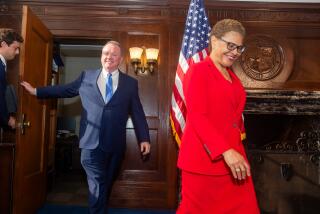Community Policing in the Era of Parks
- Share via
Los Angeles Police Chief Bernard C. Parks recently unveiled his new plan for community-based policing, in which senior lead officers--the key police contacts for local residents--will return to the streets as patrol officers and serve as mentors for rookie cops.
Under the old plan, the senior lead officer acted as a liaison between community organizations and the Police Department, addressing neighborhood crime and quality-of-life issues.
Opponents of the plan say they fear that the changes will reduce neighborhoods’ vital links with local officers. Those in favor of the new plan cite the advantage of having all officers be problem-solvers for the community rather than senior lead officers only.
Is Chief Parks’ community-based policing plan a good idea for the Valley?
Lt. Jim McDonnell, head of the LAPD Community Policing Section:
“In an effort to bridge the gap in the amount of time spent dealing exclusively with problem-solving and community-contact duties under the previous plan, the new configuration has a sergeant assigned to oversee problem-solving activities. . . . In the car, [senior lead officers] are with a team member. It’s like taking someone who is viewed as removed from the field and putting them in the quarterback position, with the sergeant in the coaching role. . . . [The new plan] will help increase the accountability at all levels of the organization and [will help us] engage in effective community/police problem-solving.”
Page Miller and Sandra Munz, members, North Hollywood Neighborhood Watch:
“We want Chief Parks to be aware of how successful the program has been and what a great partnership the senior lead officers have forged with the community. . . . The reason neighborhoods have so embraced community policing is because of the personality of the officers. The [new] plan calls for a [sergeant] to be between the lead officer and the community. What we’d like is for the senior lead officers to stay in their positions and incorporate the [rookie officers] into the already existing senior-lead daily duties.”
Los Angeles City Councilwoman Laura Chick:
“I have always believed that community policing needed to be expanded. . . . I know that what [Parks] is aiming to deliver is increased safety and reduced crime. . . . Everyone, including myself, is wary when radical changes are introduced. Part of the public concern is that they’re used to senior lead officers responding a certain way to neighborhood needs and don’t want a change. . . . I, along with members of the community, will keep a close eye on whether this is working. If it’s not, we’ll evaluate it and ask the chief to take a step back.”
Senior Lead Officer Ed Brentlinger, LAPD North Hollywood Division:
“Part of my job is to integrate the public with the police. I like to put a face on the department. I take monthly tour groups of citizens to LAPD facilities. . . . It’s really helped to make the community and the police close. Under the new plan, the [department] wants to depersonalize the police, which is the complete opposite of what we’ve done here for the last seven years. . . . I know the neighbors and go to Neighborhood Watch meetings because I know the issues. This will all change now.”
More to Read
Sign up for Essential California
The most important California stories and recommendations in your inbox every morning.
You may occasionally receive promotional content from the Los Angeles Times.













